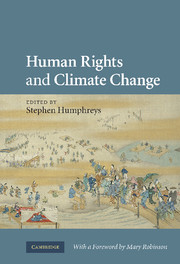Book contents
- Frontmatter
- Contents
- Authors' biographies
- Acronyms
- Acknowledgements
- Foreword
- Introduction: human rights and climate change
- PART I Rights perspectives on global warming
- 1 Competing claims: human rights and climate harms
- 2 Climate change, human rights and moral thresholds
- 3 Equitable utilization of the atmosphere: a rights-based approach to climate change?
- 4 Climate change, human rights and corporate accountability
- 5 Rethinking human rights: the impact of climate change on the dominant discourse
- PART II Priorities, risks and inequities in global responses
- Conclusion
- Appendix: climate change impacts on human rights
- Index
- References
4 - Climate change, human rights and corporate accountability
from PART I - Rights perspectives on global warming
Published online by Cambridge University Press: 04 August 2010
- Frontmatter
- Contents
- Authors' biographies
- Acronyms
- Acknowledgements
- Foreword
- Introduction: human rights and climate change
- PART I Rights perspectives on global warming
- 1 Competing claims: human rights and climate harms
- 2 Climate change, human rights and moral thresholds
- 3 Equitable utilization of the atmosphere: a rights-based approach to climate change?
- 4 Climate change, human rights and corporate accountability
- 5 Rethinking human rights: the impact of climate change on the dominant discourse
- PART II Priorities, risks and inequities in global responses
- Conclusion
- Appendix: climate change impacts on human rights
- Index
- References
Summary
It is about social justice and the human rights of the world's poor and marginalised. Failure to act on climate change would be tantamount to a systematic violation of the human rights of the poor.
(Watkins 2007)climate change has clear and immediate implications of the full realization of human rights, including inter alia, the right to life, the right to take part in cultural life, the right to use and enjoy property, the right to an adequate standard of living, the right to food, and the right to the highest attainable standard of physical and mental health.
(Malé Declaration, Human Dimension of Global Climate Change, Adopted 14 November 2007, Malé)Businesses are key actors in the governance of the environment and climate change is no exception. From the late 1980s to the present day business actors have mobilised themselves effectively to shape national, regional and international policy on climate change. They have done this by organising themselves into industry organisations to express their collective interests and represent their concerns before, during and after rounds of international negotiations as well as actively engaging with all aspects of the issue, from funding scientific work and economic studies to working with the media and publishing position papers (Levy 2005; Newell 2000; Newell and Paterson 1998). Alongside this, from the 1990s onwards there has been growing interest in the role of business in efforts to protect human rights (Amnesty International 1998; Muchlinski 2001; ICHRP 2002; Ruggie 2007).
- Type
- Chapter
- Information
- Human Rights and Climate Change , pp. 126 - 158Publisher: Cambridge University PressPrint publication year: 2009
References
- 1
- Cited by



